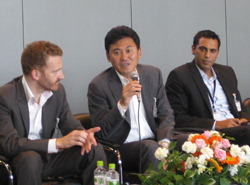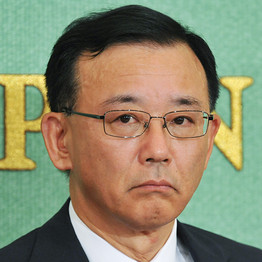Turning Japanese, a new blog on Japanese naturalisation written by several naturalised Japanese citizens (including some regular commenters on this blog) has had a number of informative posts on the topic since launching recently. The latest post tackles the issue: do you have to take a Japanese name when you naturalise? The post ends with question, and a reference that may not be familiar to everyone, which has Curzon, MF’s vice chairman of legal niggling, taking issue:
As a side note, just because a 漢字 {kanji} is legally acceptable for use in a name doesn’t necessarily mean that it’s appropriate. Characters like 悪 {aku} (bad), 闇 {yami} (darkness), 無 {mu} (nothingness), are on the list… but depending on how you use them, a name with a very negative connotation may not be accepted. Remember the parents who tried to name their child 悪魔 {Akuma} (demon)?
 The reference to the child “demon” may not be familiar to everyone. It refers to a somewhat famous case that rocked Japan in the early 1990s, when a father (with the apparent approval and support of his wife) submitted a birth certificate to the municipal office that named his son Akuma, using the kanji characters for demon. Most people think the municipal office rejected the name and the parents had to choose a different name. But the case was actually more complex, and dragged on for several months, and the parents actually won a court case they filed against the city–only after this court victory did they chose to initiate a compromise that brought the fiasco to a close.
The reference to the child “demon” may not be familiar to everyone. It refers to a somewhat famous case that rocked Japan in the early 1990s, when a father (with the apparent approval and support of his wife) submitted a birth certificate to the municipal office that named his son Akuma, using the kanji characters for demon. Most people think the municipal office rejected the name and the parents had to choose a different name. But the case was actually more complex, and dragged on for several months, and the parents actually won a court case they filed against the city–only after this court victory did they chose to initiate a compromise that brought the fiasco to a close.
The story begins on 11 August 1993, when Shigeharu Sato (30), who managed a “snack” bar, went into the Akishima municipal office to submit the legal birth certificate for his son. In Japan, the birth certificate issued at the hospital merely states the technical details of the birth — the child is not legally registered until a legal birth certificate is submitted at the local municipal office, which must be done within two weeks of the birth, and at which time a name is given. The paperpusher at the municipal office’s koseki (family registry) window accepted the forms containing the name Akuma without asking any questions.
The following day on 12 August, a different person working in the same division took issue with the name. He referred the matter to his superior in the Legal Affairs office, who responded that there was no problem with the name. However, he changed his mind the following day on 13 August when the papers were to be finalised, and having doubts, the form was completed but the mayor’s seal was not placed on the document. The municipality thus did not complete the family registry procedure. The parents were not informed of this until 28 September — six weeks later — when the mayor of Akishima officially informed the parents that the child’s name of Akuma was unsuitable, and that the child’s name was temporarily noted as “undesignated” on the family registry until they chose an acceptable name.
The father immediately filed a complaint with the Hachioji division of the Tokyo Family Court on 4 October, representing himself and without consulting a lawyer, on the basis that the town’s actions violated his parental rights. He asserted that the name Akuma was fine, as it used characters permitted by article 50 of the Family Registry Law, and that his son was fortunate to have such a unique name. Did he suffer from lack of counsel, or the bizarre nature of his request in the face of courts that many believe are conservative? No — the court quickly came to a ruling that supported the right to reject an unfavorable name, but ruling in favour of the parent plaintiffs less than three months after the complaint was filed. To translate and summarise the ruling:
In the structure of rights in society, the right of naming a child is part of parental rights, and parents may assert this right against other members of society. If there is a clear issue with regard to the suitability of the name chosen by the parent that could affect the child’s welfare, then, as the child has no ability to assert its right to refuse that name that could damage its welfare, the family registry authorities may think they can reject a name on that basis. Indeed, on the face of it, the name “Akuma” is a violation of the parent’s right to name their child.
However, while it may be possible for a municipal office to reject a name such as Akuma on the basis that this is violation of parental rights, in this case, as the municipal office has already accepted the document, it was a violation of its authority to thereafter delete that name, and the name is valid.
This ruling accurately follows an academic concept of administrative law, that an administrative notification is finalised upon “submission” (juri) to the correct administrative organ, and not at the time of “arrival” (toutatsu), meaning that no proactive action by the administrative organ is required.
The mayor immediately petitioned to the Tokyo High Court, and the story became national news. The father went on TV and made bizarre statements like “I want to call my next child “Emperor” (帝王) or “Explosion (爆弾)!” But facing further time and money on an issue, he sought a compromise. He first proposed to use the hiragana (あくま)for “Akuma,” which the municipal office rejected. He then chose different characters for the same name (exact kanji unknown but believed to be 亜区馬, 亜駆 or 阿久真). The mayor withdrew his appeal and the high court never made another decision on the matter.
During this fiasco, Akishima asked for help from the national government to clarify the rules for accepting family registry names, but no proactive action was taken then, nor to this day, to restrict the use of characters available for use on the family registry. The Ministry of Justice maintains a list of characters that can be used on a family registry as required by the implementation regulations of the Family Registry Law, and that database include both “悪” and “魔.” As far as the judiciary and the authorities are concerned, the rule as stated by the family court stands as valid — as long as you can get your birth certificate received by the municipal office, you can use any characters you like. To the best of my knowledge and research, there is no government order or anything legal that officially prevents the use of negative characters.
ENDNOTE: Family values advocates won’t be surprised to hear the unpleasant aftermath. The father’s business went bust in 1994, the parents divorced in 1996, and the father, who obtained custody, was arrested months later for possession of heroin, at which time he had links to the yakuza. Akuma was cared for by his paternal grandparents and then placed in an orphanage. When his father was released after serving four years in jail, he refused to take custody of the child due to his economic circumstances. Akuma will today be in high school, if he is still attending. His mother said in an interview in 2006, “After my ex-husband was arrested I looked after the child, but circumstances were too difficult and we lived apart. After that he was raised by my ex’s parents. I don’t know what happened after that, but when he grows up, one time would be enough so I hope to see him when he’s older.” Perhaps we shouldn’t be surprised the parents abandon their children when they wanted to call him “demon.”



 The reference to the child “demon” may not be familiar to everyone. It refers to a somewhat famous case that rocked Japan in the early 1990s, when a father (with the apparent approval and support of his wife) submitted a birth certificate to the municipal office that named his son Akuma, using the kanji characters for demon. Most people think the municipal office rejected the name and the parents had to choose a different name. But the case was actually more complex, and dragged on for several months, and the parents actually won a court case they filed against the city–only after this court victory did they chose to initiate a compromise that brought the fiasco to a close.
The reference to the child “demon” may not be familiar to everyone. It refers to a somewhat famous case that rocked Japan in the early 1990s, when a father (with the apparent approval and support of his wife) submitted a birth certificate to the municipal office that named his son Akuma, using the kanji characters for demon. Most people think the municipal office rejected the name and the parents had to choose a different name. But the case was actually more complex, and dragged on for several months, and the parents actually won a court case they filed against the city–only after this court victory did they chose to initiate a compromise that brought the fiasco to a close. 
